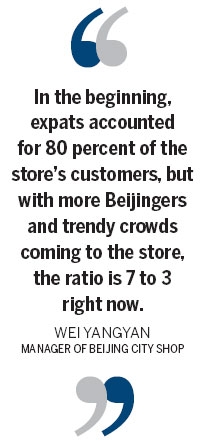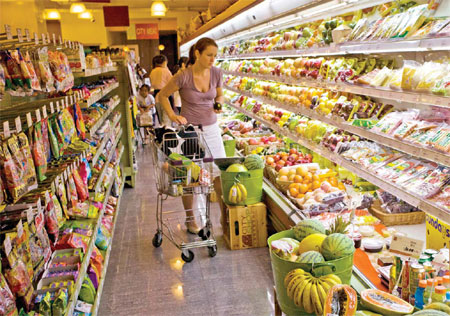Safety is specialty
Updated: 2012-03-30 09:09
By Yao Jing (China Daily European Edition)
|
|||||||||||
|
|
More high-end supermarkets are popping up in China in light of recent food scandals
For Gaelle Voss, a 45-year-old housewife who relocated her family to Beijing from Shanghai two years ago, her reason for shopping at a gourmet grocery store is a no brainer: It's safer. The Franco-German woman often buys a wide range of groceries at City Shop in the Sanyuanqiao neighborhood despite the store's exorbitant prices.
For Voss, her top concern is access to pesticide-free vegetables and fruits.
"Greenpeace's Supermarket Ranking Guide published in 2010 was good news, placing City Shop in second position for its ban on pesticide use on its own brand products," she says.
|
 |
"I have been shopping at City Shop three times a week for more than eight years now, first in Shanghai and now in Beijing. I buy fruits, vegetables, meat, rice, dairy products, biscuits, chocolate, jam, pretty much everything really."
Voss' willingness to accept high prices for safer foods is not only limited to expatriates or the wealthy. As more and more food scandals rock the nation and as increased buying power spreads to China's middle class, there has been a stronger attraction to high-end foods, such as organic produce, and high-end supermarkets that are more expensive but considered more reliable.
Responding to this increased demand from consumers, a group of Chinese supermarkets are expanding in the domestic market and selling both home-grown and imported foods in big cities such as Shanghai, Beijing and Shenzhen.
Supermarkets in China have for years sold imported foods but because of recent food scandals, anxiety over what is being served at the dinner table and the central government's push to grow the service industry, growth opportunities are popping up fast for gourmet supermarkets.
More than anything, gone are the days when shoppers could only find a Godiva chocolate bar or premium marinara sauce at a specialty shop.
City Shop, for example, ships fresh produce and meat from its City Farms located in Shanghai, Hainan and Yunnan. These farms provide food for not only City Shop outlets but for five-star restaurants and hotels in Shanghai and over 20 cities across the country.
It also directly imports goods from more than 40 suppliers in Europe and the United States.
Another niche supermarket, Ole, which is owned by Fortune 500 company China Resource Vanguard Co Ltd, has 17 stores since it was established in 2004. This year, it has plans to expand to 27 stores in 10 cities, including second-tier cities such as Shenyang and Jinan. On May 1, it will open a store in MixC shopping mall in Chengdu, Sichuan province.
"We have picky standards on locations, such as enough parking lots, convenient transportation, proximity to high-end communities, large-scale shopping centers and 5-star hotels," says Xin Qi, senior brand manager of Ole.
She says more than 75 percent of Ole's products are imports, mostly cheese, meat, wines, organic vegetables and fruits, seafood and sushi as well as chocolate.
BHG, a brand of Beijing Hualian Group Investment Holding Co Ltd, owns more than 80 supermarkets across the country. The first BHG store was opened in Beijing's Shin Kong Place in April 2007 and there are now 18 stores across the city. The company has plans to open more than 35 stores by the end of the year.
Today's Top News
Rescuers race against time for quake victims
Telecom workers restore links
Coal mine blast kills 18 in Jilin
Intl scholarship puts China on the map
More bird flu patients discharged
Gold loses sheen, but still a safe bet
US 'turns blind eye to human rights'
Telecom workers restore links
Hot Topics
Lunar probe , China growth forecasts, Emission rules get tougher, China seen through 'colored lens', International board,
Editor's Picks

|

|

|

|

|

|






